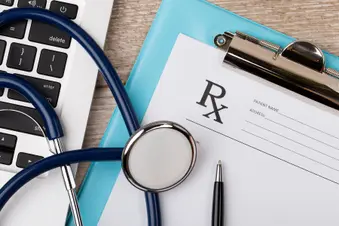
When you have pulmonary arterial hypertension (PAH), the small blood vessels in your lungs narrow. That makes it harder for blood to flow the way it’s supposed to. This leads to high blood pressure in the arteries that carry blood from your heart to your lungs.
Without treatment, the heart gets weaker because it has to work harder to pump blood throughout the body. The goal of PAH medications is to relax or widen blood vessels so blood can flow more freely. There are lots of treatment options to consider, including pills, medicines you inhale (breathe in), and infusions. Let’s take a closer look.
How Do PAH Medications Boost Blood Flow?
PAH medicines help blood flow more freely by targeting one of three substances your lungs make:
Nitric oxide. Cells in your lungs make this type of gas. It affects how relaxed and wide your blood vessels are.
Endothelin. Endothelin is a peptide, or small protein fragment, that controls blood pressure and tightening of your blood vessels. It’s made by the cells that line your blood vessels.
Prostacyclin. This substance is also made by cells in your blood vessels. It keeps platelets from sticking together and opens up blood vessels.
What PAH Medications Target Nitric Oxide?
Medicines that work to keep blood vessels open by affecting nitric oxide fall into two drug classes known as phosphodiesterase inhibitors (PDE5 inhibitors) and soluble guanylate cyclase stimulators. They’re pills taken by mouth.
What are side effects of medicines that affect nitric oxide?
Common side effects of sildenafil and tadalafil include:
- Headache
- Flushing
- Feeling lightheaded or dizzy
- Nausea
- Runny or stuffy nose
- Muscle or back pain
Common side effects of riociguat include:
- Headache
- Feeling dizzy
- Indigestion
- Low blood pressure
- Anemia
- Reflux
- Constipation
- Bleeding
What PAH Medications Target Endothelin?
Drugs in this class are known as endothelin receptor antagonists (ERAs). That’s because they block protein receptors that endothelin normally binds. Blocking those receptors helps blood vessels stay relaxed. They also raise lower blood pressure in your lungs and help the heart pump blood better.
Medicines in this class are taken by mouth and include:
- Ambrisentan (Letairis)
- Bosentan (Tracleer)
- Macitentan (Opsumit)
What are side effects of medicines that affect endothelin?
Common side effects of endothelin receptor antagonists include:
- Headache
- Joint pain
- Low blood pressure
- Fainting
- Flushing
- Irregular heartbeat
- Cold-like symptoms
What PAH Medications Target Prostacyclin?
Treatments that keep blood vessels in your lungs open and relaxed by affecting prostacyclin or the prostacyclin receptor can be taken by mouth, inhaled, infused, or injected. They include:
- Epoprostenol (Flolan, Veletri)
- Iloprost (Ventavis)
- Selexipag (Uptravi)
- Treprostinil (Remodulin, Tyvaso)
Common side effects of epoprostenol, iloprost, and treprostinil, also known as prostacyclin analogues, include:
- Flushing
- Headache
- Muscle pain
- Coughing
- Diarrhea
- Nausea
- Vomiting
- Indigestion
- Irritated throat
- Flu-like symptoms
- Rash
Common side effects of selexipag, a selective IP receptor agonist, include:
- Headache
- Jaw pain
- Muscle pain
- Joint pain
- Flushing
- Rash
- Anemia
- Nausea
Macitentan and tadalafil (Opsynvi) target both nitric oxide and endothelin. Common side effects of include:
- Edema, or swelling from fluids
- Anemia, or low red blood cells
- Headache or migraine
Other Treatments for PAH
Along with these, you may take other medicines such as:
- Blood thinners
- Medicine to keep your heart beating normally
- Diuretics to get rid of extra fluid
- Oxygen therapy
How to Choose a PAH Treatment Plan That’s Right for You
It’s important to find a doctor with lots of experience treating this chronic condition. If you don’t have a specialist already, ask your primary care doctor if they can refer you to a specialist at an accredited center. This way, you can be sure to get the latest advice and treatments.
Go to your appointment ready to ask questions about which treatments they recommend and why. Some questions to ask that can help you make the best decision include:
- What are the side effects of the treatment you recommend?
- How long will it take to work? How well is it expected to work?
- What happens if the drug I choose doesn’t work? Can I switch to another one?
- What are the pros and cons of taking medicine by mouth or breathing it in versus one that’s infused or injected?
- Where can I get help if I have financial concerns related to my PAH treatment?
- Should I consider a clinical trial?
The right medicine for you depends on several things, such as:
- Your age
- Whether you're pregnant or breastfeeding
- Other medicines you’re taking
- Other health conditions you have
Be sure to let your doctor know if you’re allergic to certain medicines, foods, dyes, or preservatives.
Show Sources
Photo Credit: iStock/Getty Images
SOURCES:
Cleveland Clinic: “Pulmonary arterial hypertension,” “Endothelin.”
American Lung Association: “PAH Medication & Treatment Guide.”
Stanford Medicine: “FDA-approved Treatments for Pulmonary Hypertension.”
Pharmacology & Therapeutics: “Nitric oxide in the lung: therapeutic and cellular mechanisms of action.”
Global Cardiology Science & Practice: “Role of prostacyclin in pulmonary hypertension.”
Mayo Clinic: “Selexipag (oral route).”